Topic: Health care

Interview of Doug Mays, September 25, 2020
Interviewed by Alan Conroy
This interview with former Speaker Doug Mays contains good insight into how the Kansas House of Representatives functioned at the end of the Twentieth Century and the first decade of the Twenty-First. The institution was changing as its membership became more conservative. Mays describes in great detail how its leadership dealt with controversial issues such as school finance and taxation. Mays cites two issues as his proudest accomplishments: passing a sales tax to lower property taxes for Washburn University and neighborhood revitalization legislation. Speaker Mays notes that every time a bill came through, he read Show Moreit. His discussion of the power of the speaker is illustrated with numerous examples. “ I believed in the process. I believed that the speaker was the keeper, the protector of the process.” He promoted civility in the body and developed a good relationship with the Minority Leader Dennis McKinney which allowed him to end the 2005 Special Session without adjourning sine die. Mays promoted greater use of technology for the legislature and tightening of deadlines to ensure smooth operations. There are several examples of his relationship with governors. Anyone interested in being a speaker should read this interview. Show Less

Interview of Sandy Praeger, October 18, 2019
Interviewed by Joan Wagnon
Former Kansas legislator Sandy Praeger describes in this 2019 oral history interview how she never anticipated having a career in politics when she ran for the Lawrence City Council. Praeger looks back on her service in the Kansas House and Senate and her time as the elected Kansas Insurance Commissioner. While in the Legislature, Praeger represented a Lawrence district that she described as being a place where "it was easy to run more on policy issues than any kind of political ideology." Praeger ran for the State Senate after one term in the House. Praeger built her Show Morebackground on health issues, including insurance, in the Legislature serving on the Public Health and Welfare, Children and Families, and Insurance and Financial Institutions committees. She recalls stepping into the role of committee Chair during her first session in the Senate and presiding as Vice President of the Senate many years later. Praeger's background on health policy came to the forefront while the country was implementing the Affordable Care Act which she strongly supported as Kansas Insurance Commissioner. Show Less
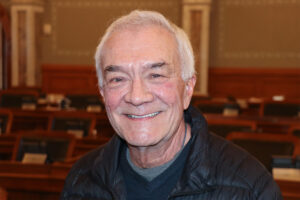
Interview of Carlos Mayans, February 11, 2022
Interviewed by Eric Sexton
Wichita, Kansas seems an unlikely place to find a Cuban-American as mayor. But Carlos Mayans' political career hasn't followed traditional paths. One TV station that supported him for Mayor gave him kudos for his tenacity in lowering airfares at the Wichita airport. Mayans' interview highlights his coming to Kansas because of the revolution in Cuba to join his brother and sister. He started his own insurance agency and later, ran for the legislature before becoming Mayor of Wichita. His interview is replete with examples of his interactions with lobbyists, fellow legislators and campaign stories. Show MoreMayans notes that Americans love to label people, and he is difficult to label. He had an impact on health policy as chair of the committee dealing with health issues such as assisted living and skilled nursing care. As Mayor of WIchita , the development of the Affordable Air Fares program was a significant boost to economic development as was the construction of an arena. Show Less
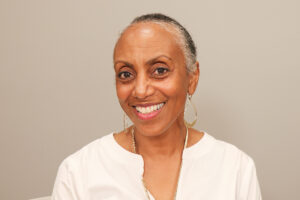
Interview of Melody McCray-Miller, April 21, 2022
Interviewed by Frances Jackson
Melody McCray-Miller describes her job as speaking truth to issues that were relevant at that time, and representing a group of people who were marginalized. Rep. Miller was not the "status quo." She doesn't consider herself a "politician" but instead, a public servant. Her concept of public policy or public service was influenced by the fact that she is a Black woman who was raised in a Black family. She is the daughter of Billy Q. McCray, the first African American Commissioner in Sedgwick County who also served as a state Senator. Show More One of her mentors described her as "tough as leather." Miller was in business with her husband, and also taught school prior to running for office. She detailed how she handled conflicts or incidents of racial discrimination by "pushing forward." The latter part of the interview deals with a variety of legislative issues McCray-Miller initiated or followed. Those issues ranged from early childhood education, to payday lending, juvenile justice and health policy. Show Less

Interview of Thomas (Tim) Owens, October 14, 2022
Interviewed by Nancy Parrish
Owens described his career path from military officer to private attorney to city council member to the state legislature. He served seven years in the Kansas House and then ran for the Kansas Senate where he chaired the Senate Judiciary Committee. Owens recounts the pressure from Governor Brownback to change the merit selection procedure for judges, making them elected. Also, the education bills were now being sent to the Judiciary committee because of lawsuits and that also caused friction because of the court's decisions on resolving the Montoy and Gannon cases. Owens also dealt with Show Morea death penalty bill which failed 20-20. He described frequent trips "across the street" carrying messages between the Chief Justice and the Governor's office. He lost his bid for reelection to the Senate in 2012 and ended up teaching at Johnson County Community College and retired from the military as a full colonel. He even served a year as municipal judge in Lenexa. Show Less
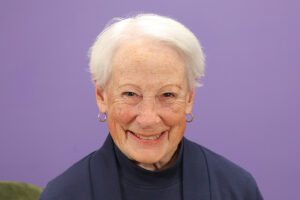
Interview of Nancy Landon Kassebaum Baker, October 17, 2022
Interviewed by Deanell Reece Tacha
Nancy Kassebaum, still lively at age 90, recalled being a young girl in Topeka growing up with a famous father, Alf Landon. She described her motivation for entering a US Senate race in 1978 and turned to friends and the League of Women Voters in Wichita for help with that highly contested primary race. Kassebaum had a "special relationship" with the other Kansas Senator, Bob Dole. Her legislative interests in the U.S. Senate were foreign relations, Africa and apartheid, and a major health care bill she worked with Senator Ted Kennedy. Toward the end of Show Moreher senate career she married Tennessee senator Howard Baker, and went to Japan with him as wife of the Ambassador. After Baker's death she returned to the ranch in Burdick, Kansas where she still follows politics closely. Show Less
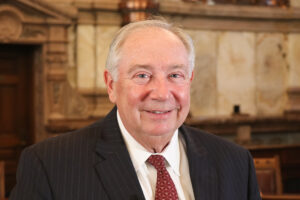
Interview of Jim Denning, April 13, 2023
Interviewed by Alan Conroy
Jim Denning served four years as Majority Leader for the Kansas Senate. His interview reveals his Western Kansas leanings, despite having worked, lived and represented Johnson County. HIs legislative interests included health care policy, funding KPERS and school finance. He described Senate Bill 9--KU Cancer designation--as one of his important contributions. Denning found that Governor Brownback’s tax plan was creating problems for Kansas – “too deep and unsustainable.” His philosophy was, "At the end of the day, you have to govern." Throughout his tenure in the Senate, Medicaid expansion was a pressing issue, but Show Morehe didn’t like the way the bills were constructed, so he developed a Republican alternative that he thought would be a model for the country. His interview details how he kept the Democratic alternative from passing, but his own bill was caught up in abortion politics and failed to pass. Denning led the Senate during 3 special sessions: school finance, COVID and repealing the Brownback tax plan. Historians will love this interview because of his candor and his position at a pivotal time in the legislature's history. Show Less
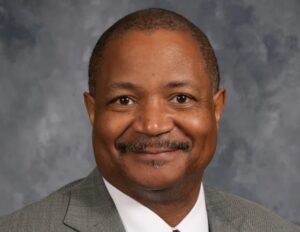
Interview of Frank Henderson, May 21, 2025
Interviewed by Mark Tallman
At the time when a group of high school students discovered that Fred Seaman, the namesake of District 345 was the Exalted Cyclops of the Ku Klux Klan in the 1920's, Frank Henderson was President of the Seaman School Board. His interview describes the process the board went through to investigate and analyze the students' recommendations to change the district name. At the end of the process, the name stayed, but Fred Seaman's photo and memorabilia were removed from the school buildings and placed in the museum. They aligned the district with the community, not Fred Seaman's Show Moreviews. He said the outcome didn't satisfy anyone but it was unanimous. Henderson's interview describes many challenging situations at the local, state and national level as he served on various state and national boards of education. Henderson and Tallman's exchange highlights major issues in education that affected school boards and local communities. The interview reflects Henderson's view that "Every Student Matters." He believes, "we, as fellow humans, have the responsibility to see the value in every person and do what we can to ...help that person fulfill their potential." Show Less
